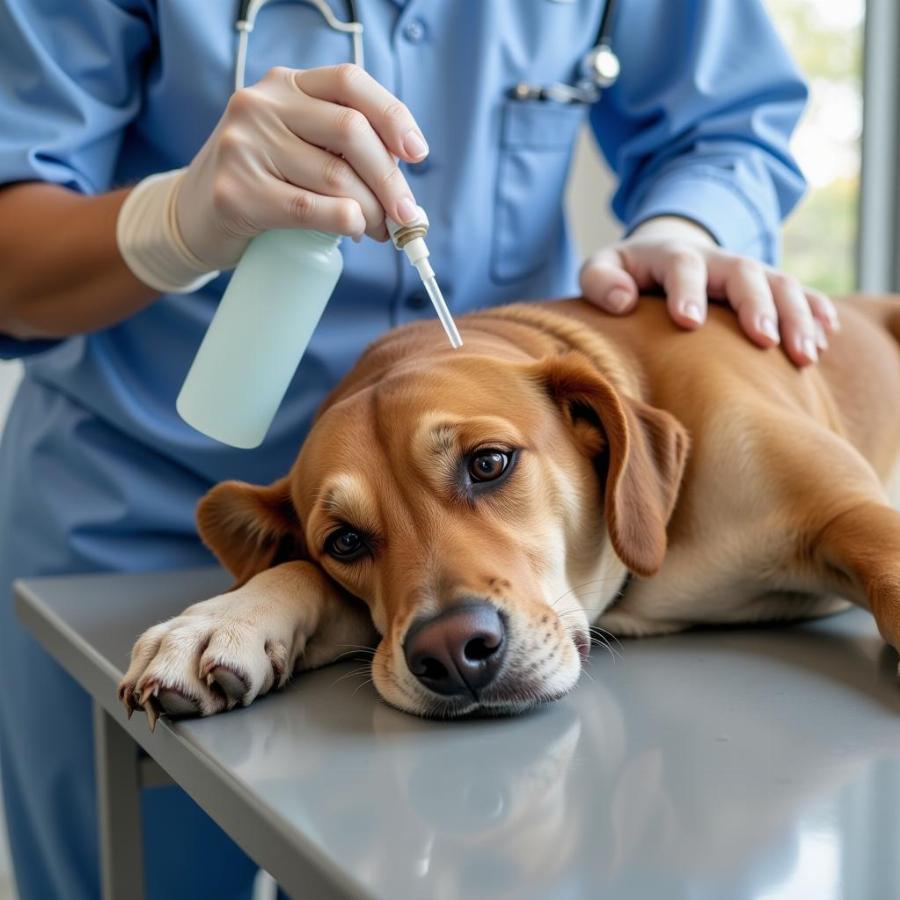A male dog’s neuter incision becoming infected is a concerning situation for any pet owner. Understanding the signs, causes, and treatment options for an infected neuter incision in male dogs is crucial for ensuring a smooth recovery. This article will guide you through everything you need to know about dealing with this common post-operative complication in male dogs, ensuring your furry friend returns to full health quickly.
Recognizing an Infected Neuter Incision
How can you tell if your male dog’s neuter incision is infected? Look out for these common signs: redness, swelling, discharge (especially if it’s pus-like or has a foul odor), excessive licking or chewing at the incision site, pain or discomfort when the area is touched, lethargy, and loss of appetite. Early detection is key to preventing further complications.
Causes of Infection
Several factors can contribute to an infected neuter incision. Bacteria can enter the wound during or after surgery. Unsanitary surgical environments or improper post-operative care can increase the risk. Excessive licking or chewing at the incision by the dog can also introduce bacteria and disrupt the healing process. Sometimes, underlying health issues can make a dog more susceptible to infections.
Treatment for an Infected Incision
If you suspect your dog’s neuter incision is infected, consult your veterinarian immediately. why did my dog pee on me They will likely prescribe antibiotics to combat the infection. The vet may also recommend cleaning the wound with an antiseptic solution and applying topical ointments. In some cases, surgical drainage or debridement of the wound might be necessary to remove infected tissue.
 Treating an Infected Neuter Incision
Treating an Infected Neuter Incision
Preventing Incision Infections
Prevention is always better than cure. Ensure your dog’s surgical environment is sterile. Follow your veterinarian’s post-operative care instructions meticulously. This includes keeping the incision area clean and dry, preventing your dog from licking or chewing the wound (using an Elizabethan collar), and administering any prescribed medications. Monitoring the incision regularly for any signs of infection is also crucial.
Home Care After Neuter Surgery
Proper home care is essential for preventing infection and promoting healing. Keep your dog’s activity restricted to prevent pulling or tearing the stitches. Provide a clean and comfortable recovery area. Monitor the incision site daily for any changes. Contact your vet immediately if you notice anything unusual.
When to Call Your Vet
Call your veterinarian immediately if you notice any of the signs of infection mentioned earlier. Don’t wait for the symptoms to worsen. Early intervention is crucial for a successful recovery. Also, contact your vet if your dog seems excessively uncomfortable or if the incision is bleeding or opening up.
Is My Dog in Pain?
Dogs often experience some discomfort after neuter surgery. Signs of pain can include whining, restlessness, decreased appetite, and reluctance to move. Your veterinarian will likely prescribe pain medication to manage your dog’s discomfort. Ensure your dog rests in a comfortable and quiet environment.
Expert Insights
Dr. Emily Carter, DVM, a renowned veterinary surgeon, emphasizes, “Post-operative care is as crucial as the surgery itself. Owners must diligently follow their vet’s instructions to minimize the risk of complications like infections.”
Dr. Michael Davis, DVM, adds, “Early detection of infection is key. Don’t hesitate to contact your veterinarian if you have any concerns about your dog’s recovery.”
Conclusion
A male infected neuter incision dog requires prompt veterinary attention. By understanding the signs, causes, and treatment options, you can ensure your furry friend receives the best possible care and enjoys a speedy recovery. Follow your veterinarian’s instructions carefully and monitor your dog closely.
FAQ
- How long does it take for a neuter incision to heal? Typically, 10-14 days.
- Is it normal for the incision to be slightly red? Some redness is normal, but excessive redness is a sign of infection.
- Can I bathe my dog after neuter surgery? No, avoid bathing your dog until the incision is fully healed.
- What if my dog keeps licking the incision? Use an Elizabethan collar to prevent licking.
- When can my dog resume normal activities? After 10-14 days, as advised by your vet.
- What if the incision opens up? Contact your veterinarian immediately.
- How can I keep the incision area clean? Follow your vet’s instructions for cleaning the wound.
Other Related Articles on Beaut Dogs
You might also find these articles helpful:
- [Link to an article about post-operative care for dogs]
Beaut Dogs is your ultimate resource for all things dog-related. We provide expert advice and information to help you care for your canine companion. For personalized support and answers to your specific questions, contact us at Email: [email protected]. Beaut Dogs is here to help you navigate the wonderful world of dog ownership.